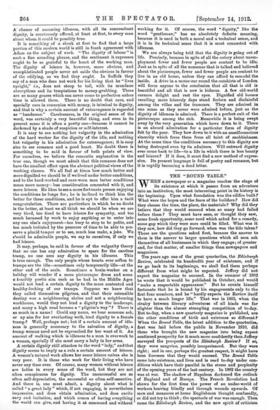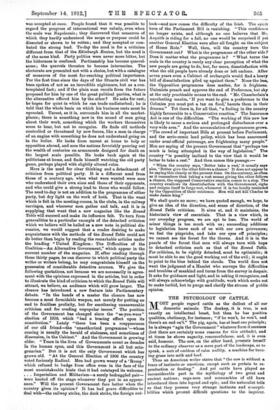THE "ROUND TABLE."
WHEN a newspaper or a magazine reaches the stage of its existence at which it passes from an adventure into an institution, the most interesting point in its history is the beginning. Upon what foundation was the edifice built? What were the hopes and the fears of the builders ? How did they choose the time, the place, the materials ? Why did they believe that they would succeed when so many had failed before them ? They must have seen, or thought they saw, some fresh opportunity, some need which asked for a remedy, some gap which they were sure could be filled. What was it they saw, how did they go forward, when was the tide taken? Those are the questions asked first, because the answer to them is the answer to larger questions which all men ask themselves of all businesses in which they engage; of greater and, for that matter, of smaller things than newspapers and. magazines.
Ten years ago one of the great quarterlies, the Edinburgh. Review, celebrated its hundredth year of existence, and if we go back to its beginnings, we shall find them perhaps different from what might be expected. Jeffrey did not expect the magazine to succeed. In the summer of 1802 he wrote that it would be published in October, and would "make a respectable appearance." But he counts himself fortunate that he is bound by his engagements only to the first four numbers, and he "hardly expects the Review itself to have a much longer life." That was in 1802, when the rivalry between literary adventures of all kinds was far slighter than the almost strangling competition of to-day. But to-day, when a new quarterly magazine is published, are the other conditions of birth and existence so different ? When the .Round Table, the latest addition to the quarterlies, first was laid before the public in November 1910, did those who brought the new magazine into being expect continued prosperity for it much more confidently than Jeffrey surveyed the prospects of the Edinburgh Review? If so, they were sanguine, possibly inexperienced. But they were right; and in one, perhaps the greatest respect, it might have been foreseen that they would succeed. The Round Table came into existence, and lives and is read to-day under con- ditions which have their parallel in the stress and perplexity of the opening years of the last century. In 1802 the country was at war. The shadow of Napoleon darkened the outlook of England and of Europe. The French Revolution had shown for the first time the power of an under-world of workers heaving blindly and through wounds upwards. Of men and measures at home Englishmen thought confusedly, or did not try to think ; the spectacle of war was enough. Then came the Edinburgh Review, and the new spirit of criticism
was accepted at once. People found that it was possible to regard the progress of international war calmly, even when the scale was Napoleonic; they discovered that measures of which they hardly understood the scope or purpose could be dissected or shown to be rotten; and they accepted or com- bated the strong lead. To-day the need is for a criticism different from that of the Edinburgh Review, but the need is of the same kind. Party polities were never more bitter, but the bitterness is confused. Partisanship has become quarrel- some; the quarrels threaten to become internecine. The electorate are presented not with a choice, but with a catalogue of measures of the most far-reaching political importance. For the first time since the days of the Stuarts civil war has been spoken of not as an incredible nightmare, but as a con- templated fact ; and if the plain man recoils from the future proposed for him by one of the great political parties, what is the alternative offered him by the other ? He asks for rest; he hopes for quiet in which he can trade undisturbed ; he is told that the whole basis on which his business rests must be uprooted. Unrest, as it is, surrounds him in all the market- places ; there is something new in the sound of men going about their work, something which the workers themselves seem to hear, but not to recognize. He finds old methods controlled or threatened by new forces, like a man in charge of an engine with something he does not understand going on in the boiler. He looks from unrest at home to help or opposition abroad, and sees the nations feverishly pouring out the wealth of centuries on armaments designed for death on the largest scale possible. He looks back again at the politicians at home, and finds himself watching the old party game, perhaps played with slightly altered rules.
Here is the need for clear thinking and a detachment of criticism from political party. It is a different need from those of a century ago, when what were wanted were men who understood their own aims and those of their opponents, and who could give a strong lead to those who would follow. The need to-day is not an addition to the programme of either party, but dry light on the work of both. That is the want which is felt in the meeting-rooms, in the clubs, in the railway carriages, and wherever men gather and talk, and it is in supplying that want that a new magazine like the Round Table will succeed and make its influence felt. To turn from generalities to a particular example of the detached criticism which we believe will be hailed as a new note in political dis- cussion, we would suggest that a reader desiring to make acquaintance with the methods of the Bound Table could not do better than begin by reading the remarkable articles under the heading "United Kingdom : The Difficulties of the Coalition—An Alternative Government," which appear in the current number of the magazine. If, after reading through these thirty pages, he can discover to which political party the writer or writers belong, he may congratulate himself on the possession of considerable detective acumen. We give the following quotations, not because we are necessarily in agree- ment with the opinions expressed in the articles, but in order to illustrate the kind of criticism to which the Round Table will attract, we believe, an audience which will grow larger. The closure has introduced a new feature into Parliamentary debate. "In the hands of a master the closure has now become a most formidable weapon, not merely for putting an end to fruitless prolixity, but for smothering unanswerable criticism and for evading unpopular issues." The position of the Government has changed since the "as-you-were" election of 1910, which "had a bracing effect upon its constitution." Lately "there has been a reappearance of our old friend—the 'unauthorized programme '—whose coming is usually the herald of staleness, and sometimes of dissension, in the Cabinet." And the Government is growing older. "Years in the lives of Governments count as decades in the human span, and this Government is all but octo- genarian." But it is not the only Government which has grown old. "At the General Election of 1906 the country voted furiously Radical. Men had grown weary of a 'Rump'
which refused to budge from office even in the face of the most unmistakeable hints that it had outstayed its welcome.
. . . Imperialism and Militarism—a sorely bedraggled pair—
were hooted off the stage whenever they put in an appear- ance." Will the present Govemment fare better when the country gives its opinion ? It has had grave difficulties to deal with—the railway strike, the dock strike, the foreign out- look—and now comes the difficulty of the Irish. The spirit born of the Parliament Bill is vanishing. "This confidence no longer exists, and although no one believes that Mr. Asquith is riding for a fall, no one would be surprised if yet another General Election were after all fought on the subject of Home Rule." Well, then, will the country turn the Government out P What is the programme of the other side ? Does it matter what the programme is ? "What turns the scale in the country is rarely any clear perception of what the new people are going to do, but, far more, dissatisfaction with what the old people have already done or left undone. After seven years even a Cabinet of archangels would find a heavy bill of dissatisfaction piled up against them." None the less, the Opposition programme does matter, for it frightens.
Unionists preach and approve the end of Preference, but shy at the only practicable means to the end. "Mr. Chamberlain's unrelenting maxim, If you want to give a preference to the Colonies you must put a tax on food,' haunts them in their dreams." Yet there is, for all that, "a feeling in the country highly favourable to a Conservative reaction." The Insurance Act is one of the difficulties. "The working of this new law is likely to cause a serious and prolonged disturbance over a very wide area." And the accumulation of programmes grows. "The crowd of important Bills at present before Parliament, and the serio-comic land policy, which has been announced under semi-official patronage, are frightening many people."
Men are saying of the present Government that "perhaps too much is being attempted in the way of legislation." The country "is possibly inclined to the view that it would be better to take a rest." And then comes this passage:—
" When the country says, Better take a rest,' it usually says also, 'Better give the other fellows a chance.' It does not appear to be saying this clearly at the present time. On the contrary, as often as it remembers that taking a rest means giving the other fellows a chance, the supposed Conservative reaction comes to a stop. The country swallows its dissatisfaction with the Government, sighs and resigns itself to forgo rest, whenever it 'is too loudly reminded by the Opposition of their existence. Men will not kill Charles to make James king."
We shall quote no more; we have quoted enough, we hope, to give an idea of the direction, and sense of direction, of the Round Table criticism. It aims at, and it maintains, the historian's view of essentials. That is a view which, in our everyday progress, we are apt to lose. The world of minor things is too much with us ; succeeding additions to legislation leave each of us with our own grievances; we feel the pinpricks, and take our eyes off principles; we cannot see the forest for the thorns. And it is in the puzzle of the forest that men will always turn with hope to detached criticism such as that of the Round Table. For criticism, to be rightly detached, must be optimistic; it must be able to see the good working out of the evil; it ought to point to the blue behind the clouds. The world does not want the judgment of a Hamlet who surveys the difficulties and troubles of mankind and turns from the survey in despair. It asks for guidance and light, and in asking it recognizes, and will always acknowledge with gratitude, work which seeks not to make turbid, but to purge and clarify the stream of public opinion.







































 Previous page
Previous page